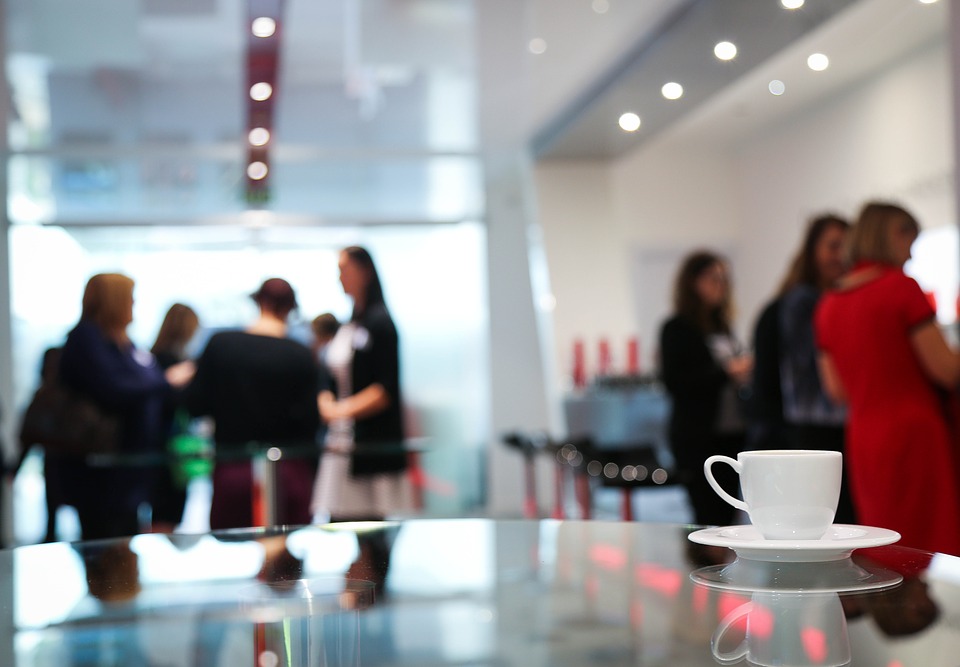It’s the conference season. It can be a battering and bewildering time for both seasoned delegates and novices alike. How can you make the most of it and not be defeated in the process? Well, avoid the coffee and you’re half way there, but we have six more tips that will help you benefit from the experience.
Conference coffee is unique. It lures you in with the promise of a sensory jump-start for the post-lunch plenary, but it delivers nothing but empty heat and the memory of something better. And yet you’ll be awash with it. Like Kate and Leonardo endlessly running down corridors in Titanic pursued by dark and mysterious water—innocuous but deadly—that will be you and the coffee. Surviving it is the first and most important rule of thriving at a conference.
You could just abstain for the duration, or favour tea instead. The tea’s usually fine. You could ration yourself, safe in the knowledge that less is definitely more. You could find a wonderful little hipster coffee shop close by, and nip out a couple of times a day for a shot of caffeine and sanity. Whatever you do, once you’ve beaten the conference coffee, the rest is a breeze.
In addition to a foolproof coffee strategy there are six simple steps to getting the most out of a conference. And not one of them involves checking the lifeboat-to-delegate ratio.
1. Plan well
You might have had to choose your sessions before arriving, but don’t let that stop you from thinking again once you’ve got the full programme in your hands. The programme, like the coffee, often promises more than it delivers. It is by turns alarming and alluring, offering impossible insights and riches. But look beyond the titles. Get a sense of both the speakers and the format. For me, these are more important than the topic. An interesting, honest, and questioning speaker can make the most mundane subject insightful and enriching. Similarly, a format that allows you to engage with others is always more useful than one at which you just have to pin your ears back.
2. Talk to people
It’s a truth universally acknowledged that the most fruitful parts of a conference are the bits in between. It’s the networking, talking to colleagues doing similar work in other universities. It’s making connections, learning from others, and sharing your knowledge. I’m not a natural at this, but it’s worth forcing yourself to overcome your shyness. Generally, people are open to being randomly approached. After all, they’re probably desperate to be distracted from the coffee. And talking to them makes you realise that you’re not alone, that many of your frustrations and issues are shared by others, and they might have found ways of solving or minimising them. Learn from them. Alternatively, they might just be an interesting person with a love of good coffee and the films of James Cameron. There’s worth in that too, and you can enjoy a little light relief from the main business of the day.
3. Question the speakers
Once again, this didn’t come naturally to me, and I had to overcome the dizziness and sweating before accepting the frightening roving microphone. However, it does make for a more interesting and engaging experience when you say what’s on your mind and see how the speakers respond. Of course, don’t do the opposite and just question for the sake of it (we’ve all had experience of that), but if something is niggling you, if you feel the speakers have skirted around an issue or you would be genuinely interested in their thoughts, pipe up.
4. Take notes
You don’t have to stenograph everything you hear, but do try to capture interesting points. Your institution might expect you to feedback to others when you return, but even if they don’t, it’s incredibly useful to have something to look back on and remind yourself about what you’ve heard. Better still, write it up as a blog post (I’m always on the lookout for guest posts on mine) or maybe use the conference as an opportunity to launch your own.
5. Use Twitter
There’s a shadow world, a secondary conference that is taking place alongside the real one. Twitter is a wonderful cascading cavalcade of commentary on what’s going on around you. Make sure you use the hashtag for the event and tune in to what others are asking, thinking, or joking about. It makes you realise that you are not alone, and others share the same interests, fears, and humour as you.
6. Look around the city
I know, I know: your hard-pressed institution has paid for you to soak up knowledge, and you feel duty-bound to take in every word. But actually, you’re most likely in a new city and you owe it to yourself to go beyond the conference venue and take it in a little. It might just be nipping out to that hipster coffee shop, but you will enjoy the conference much more if you venture further afield. Cut yourself a little slack and nip out at lunch, or in the evening—or even in that deathly plenary.
For me these six points are the essentials of conference-going.
Anything else is a bonus. Looking at the posters, picking up freebies, winning the quiz are all well and good, but it’s getting access to the insights that are useful for you that will really make your trip worthwhile. And only you can do that, by planning, talking, questioning, and networking. Oh, and by being resolute in the face of so much bad coffee.
Be strong, dear reader, be strong.
This article first appeared in Funding Insight in June 2017 and is reproduced with kind permission of Research Professional. For more articles like this, visit www.researchprofessional.com
Image: Max Pixel, CC0

